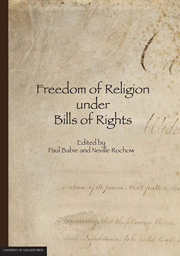Book contents
- Frontmatter
- Contents
- Acknowledgments
- List of Contributors
- Foreword by The Hon Sir Anthony Mason AC KBE: Human Rights and Courts
- INTRODUCTION
- SETTING THE SCENE
- CONTEMPORARY FREEDOM OF RELIGION ISSUES
- COMPARATIVE EXPERIENCE WITH FREEDOM OF RELIGION
- 9 Political Culture and Freedom of Conscience: A Case Study of Austria
- 10 The Sky is Falling if Judges Decide Religious Controversies! – Or is it? The German Experience of Religious Freedom Under a Bill of Rights
- 11 Religious Freedom in a Secular Society: The Case of the Islamic Headscarf in France
- 12 Religious Freedom in the UK after the Human Rights Act 1998
- 13 Judicial Interpretation, Neutrality and the US Bill of Rights
- 14 Protecting Religious Freedom: Two Counterintuitive Dialectics in US Free Exercise Jurisprudence
- 15 Walking the Tightrope: The Struggle of Canadian Courts to Define Freedom of Religion under the Canadian Charter of Rights and Freedoms
- 16 Quo Vadis The Free Exercise of Religion? The Diminishment of Student Religious Expression in US Public Schools
- 17 Freedom from Discrimination on the Basis of Religion
- 18 Ruminations from the Shaky Isles on Religious Freedom in the Bill of Rights Era
- 19 Indigenous Peoples and Bills of Rights
- TABLE OF LEGISLATION AND INTERNATIONAL INSTRUMENTS
- INDEX
11 - Religious Freedom in a Secular Society: The Case of the Islamic Headscarf in France
from COMPARATIVE EXPERIENCE WITH FREEDOM OF RELIGION
Published online by Cambridge University Press: 05 June 2013
- Frontmatter
- Contents
- Acknowledgments
- List of Contributors
- Foreword by The Hon Sir Anthony Mason AC KBE: Human Rights and Courts
- INTRODUCTION
- SETTING THE SCENE
- CONTEMPORARY FREEDOM OF RELIGION ISSUES
- COMPARATIVE EXPERIENCE WITH FREEDOM OF RELIGION
- 9 Political Culture and Freedom of Conscience: A Case Study of Austria
- 10 The Sky is Falling if Judges Decide Religious Controversies! – Or is it? The German Experience of Religious Freedom Under a Bill of Rights
- 11 Religious Freedom in a Secular Society: The Case of the Islamic Headscarf in France
- 12 Religious Freedom in the UK after the Human Rights Act 1998
- 13 Judicial Interpretation, Neutrality and the US Bill of Rights
- 14 Protecting Religious Freedom: Two Counterintuitive Dialectics in US Free Exercise Jurisprudence
- 15 Walking the Tightrope: The Struggle of Canadian Courts to Define Freedom of Religion under the Canadian Charter of Rights and Freedoms
- 16 Quo Vadis The Free Exercise of Religion? The Diminishment of Student Religious Expression in US Public Schools
- 17 Freedom from Discrimination on the Basis of Religion
- 18 Ruminations from the Shaky Isles on Religious Freedom in the Bill of Rights Era
- 19 Indigenous Peoples and Bills of Rights
- TABLE OF LEGISLATION AND INTERNATIONAL INSTRUMENTS
- INDEX
Summary
One of the most interesting examples in recent years of a confrontation between secular and religious values occurred in France in the so-called ‘affair of the headscarf’. The affair can be traced back to events in 1989, which were followed by a further series of events during the 1990s. It started when a public school in Creil, a town in northern France, expelled three Muslim schoolgirls for refusing to remove the Islamic headscarves they wore to school. The expulsions were widely reported in French and international media and were followed by further expulsions of other Muslim schoolgirls in towns and cities across the country, accompanied by growing community protests.
The affair was controversial for a variety of reasons. For one thing, it revolved around the headscarf, an item of clothing that has historically had strong and sometimes conflicting political, religious, cultural and social connotations. During the events of the affair, the headscarf sent a range of messages that were ‘heavy with symbolism’, a symbolism which could be powerful, complex and indeed contradictory.
Another important set of reasons for the controversy surrounding the affair was that it struck a social, political and cultural ‘nerve’: the principal parties in the affair were Muslim schoolgirls, many of whom were the children of immigrant families already likely to experience high unemployment and religious or racial discrimination and to live in poor housing conditions.
- Type
- Chapter
- Information
- Freedom of Religion under Bills of Rights , pp. 216 - 238Publisher: The University of Adelaide PressPrint publication year: 2012
- 2
- Cited by



